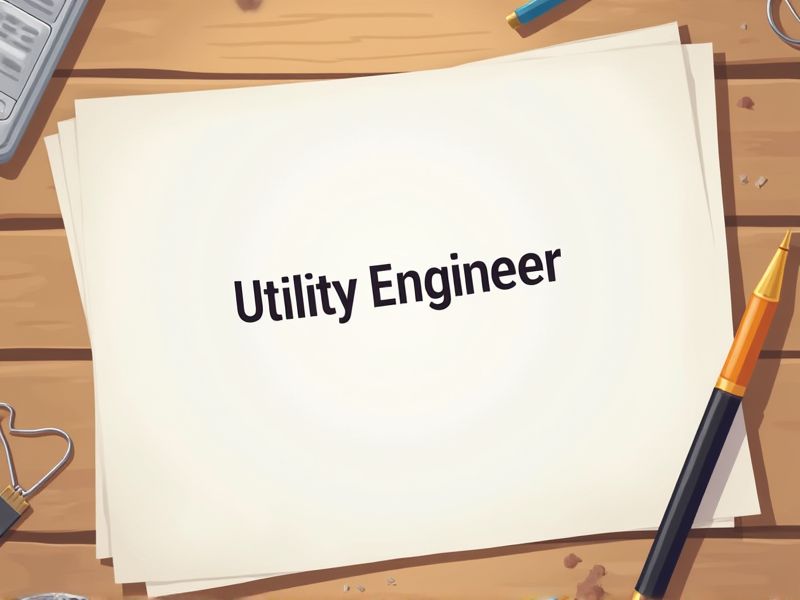
Utility Engineers are responsible for the design, maintenance, and improvement of utility systems, requiring them to possess specialized knowledge and skills. Obtaining certifications demonstrates their expertise and ensures compliance with industry standards and regulations. These certifications validate the engineer's ability to handle complex projects and operate safely in various environments. Important certifications necessary for Utility Engineers include the following.
Professional Engineer (PE) License
The Professional Engineer (PE) license ensures that a utility engineer meets national standards of competency and ethics, enhancing public trust in their work. Regulatory bodies often require PEs for project approval, meaning licensed engineers can handle critical tasks and make legally recognized decisions. Having a PE increases a utility engineer's career prospects, allowing them to take on more responsibilities and typically secure higher pay. Holding this license can also minimize legal risks for both the individual engineer and their employer by adhering to industry standards.
Certified Energy Manager (CEM)
Certified Energy Managers (CEM) provide essential expertise in energy management, which enables utility engineers to optimize operational efficiency. Energy regulations and compliance standards require precise management, and a CEM ensures that projects meet these legal mandates. Implementing the insights and strategies of a CEM can reduce energy costs and carbon footprint, aligning with environmental goals. They also bring a strategic approach to energy consumption, enhancing reliability and performance within utility operations.
Project Management Professional (PMP)
Holding a PMP certification equips utility engineers with the structured methodology to manage large-scale infrastructure projects efficiently. As utility projects often involve complex variables and stakeholders, PMP provides the necessary skills in risk management and project leadership. With rigorous timelines and budget constraints typical in the utility sector, PMP training enhances the capability to deliver projects on time and within budget. Moreover, the certification can improve communication among multidisciplinary teams, which is crucial for the integration of diverse technical systems.
Six Sigma Green Belt Certification
Achieving Six Sigma Green Belt Certification enhances a utility engineer's ability to identify and eliminate inefficiencies in processes, leading to improved operational performance. Mastery of Six Sigma methodologies equips engineers with tools to reduce defects, which minimizes operational costs and improves service quality. As utility sectors face increasing demands and regulatory scrutiny, engineers with Green Belt Certification contribute significantly to compliance and sustainability goals. Six Sigma training empowers professionals with data-driven decision-making skills, fostering innovation and resilience in utility operations.
Certified Electrical Inspector (CEI)
A Certified Electrical Inspector (CEI) is essential for Utility Engineers to ensure that electrical systems adhere to strict safety codes and regulations, minimizing the risk of malfunctions and accidents. The CEI's expertise in identifying compliance issues helps in preventing costly legal liabilities and fines for utility companies. Utility Engineers can leverage the detailed insights provided by a CEI to enhance system efficiency and longevity. Employing a CEI facilitates consistent quality checks, leading to sustained reliability and performance of electrical utility systems.
OSHA 30-Hour Training Certification
Utility engineers require the OSHA 30-Hour Training Certification because it ensures they understand workplace safety regulations, reducing the likelihood of accidents. The training provides in-depth knowledge of hazard identification and risk management, essential for maintaining a safe work environment. With certification, engineers demonstrate a commitment to upholding industry safety standards, which can enhance their professional reputation. Employers gain confidence in a certified engineer's ability to create safer job sites and potentially lower insurance costs.
Smart Grid Technology Certification
Smart Grid Technology Certification ensures utility engineers are equipped with up-to-date knowledge on integrating renewable energy sources, enhancing grid reliability and efficiency. Regulatory standards are evolving, and engineers with certification are better prepared to comply with these new requirements. The certification provides a competitive edge in the job market, as employers prioritize candidates with specialized skills in smart grid technologies. Engineers with certification are positioned to drive innovation and improve grid management, directly impacting sustainability and energy conservation efforts.
Certified Reliability Engineer (CRE)
A Certified Reliability Engineer (CRE) is crucial for a Utility Engineer to ensure systems operate efficiently and are less prone to failures. CREs are trained to apply reliability principles, leading to improved system performance and reduced maintenance costs. Their expertise helps in identifying potential risks and implementing mitigation strategies, enhancing the overall safety and reliability of utility operations. Hiring a CRE fosters a continuous improvement culture, which is essential for adapting to evolving technological and regulatory demands in the utility sector.
Water Distribution Operator Certification
Water Distribution Operator Certification is crucial for Utility Engineers as it validates their understanding of water safety regulations and best practices. This certification ensures they are equipped to manage and operate water distribution systems effectively. It also demonstrates their ability to adhere to stringent public health standards, reducing risks of contamination. By holding this certification, Utility Engineers gain credibility and trust from regulatory bodies and the communities they serve.
NFPA Electrical Safety Code Certification
The NFPA Electrical Safety Code Certification ensures utility engineers are knowledgeable about the latest safety standards, reducing the risk of workplace accidents. Compliance with this certification can lead to fewer electrical incidents, which helps in lowering operational costs related to injury and liability. Organizations employing certified engineers often gain public trust and regulatory approval more easily, enhancing their reputation. As technology evolves, the certification helps engineers keep up to date with new methodologies and regulations, ensuring effective and safe electrical system management.
Summary
You can anticipate improved technical competence when you obtain certifications as a Utility Engineer. This enhanced expertise leads to better problem-solving skills and efficient project management. Industry recognition and credibility increase, offering more career advancement opportunities. Certifications can also result in higher earning potential and job security, reflecting industry's demand for qualified professionals.
